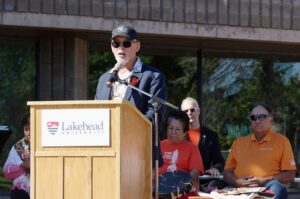Lakehead University brings community together to acknowledge Every Child Matters

By Rick Garrick
THUNDER BAY — Lakehead University kicked off the fall semester with a National Truth and Reconciliation Flag Raising and Every Child Matters Crosswalks Ribbon Cutting on Sept. 7. The Thunder Bay and Orillia-based university also has a range of other Indigenous events scheduled throughout September.
“Every child matters, that’s why we’re here today – to acknowledge that every child matters,” says Biigtigong Nishnaabeg Elder Beatrice Twance-Hynes during her opening prayer. “A lot of our people are still on that journey of healing and recovery from the traumas our people experienced from Residential School.”
Moira McPherson, president and vice-chancellor at Lakehead University, says there were 140 federally-run Indian Residential Schools that operated between 1831 and 1998.
“Today, we are here to raise the National Truth and Reconciliation Centre’s Survivors Flag,” McPherson says. “This flag is an expression of remembrance meant to honour Residential School Survivors and all the lives and communities impacted by Canada’s Residential School system. Survivors from across Canada were consulted on the flag design — every facet of this flag has meaning and was carefully crafted from those Survivor consultations.”
McPherson says the orange Every Child Matters crosswalks that were added to both the Thunder Bay and Orillia campuses are pathways that represent the university’s recognition of the harm done to Indigenous children.
“These pathways serve to remind everyone each day that we must be vigilant to ensure that no child experiences the hurt of being taken away from their families,” McPherson says.
Then Fort William First Nation Chief Peter Collins also stressed the importance of the raising of the National Truth and Reconciliation Centre’s Survivors Flag and the Every Child Matters crosswalks.
“We must continue that conversation, continue that dialogue, continue working with each other to make this truth and reconciliation really be effective, really understand each other, really understand where we need to be in the future,” Collins says. “When I look at the crosswalk, you’re going to see that crosswalk every day — it’s going to remind you of the kids that never made it home, never returned to their loved ones or their families or back to their communities. The 215 [potential grave sites of children] that were found in Kamloops, (B.C.), really resonated throughout the country, resonated throughout each of our communities, that we must never forget them.”
Anishinabek Nation Northern Superior Regional Deputy Grand Council Chief Melvin Hardy says reconciliation efforts are important and necessary in the process of healing.
“Outward demonstrations of support and acknowledgement of history such as this are beacons of hope for many that this crosswalk will be used by and hopefully will touch as many,” Hardy says. “Hopefully people will take a moment to reflect on what Every Child Matters means each time they use it.”
Denise Baxter, vice provost Indigenous Initiatives at Lakehead University, says Lakehead University is also participating in Maadaadizi 2022, which is being held on Sept. 10 at Marina Park to welcome post-secondary Indigenous students to their education institutions in Thunder Bay.
“We have Pam Palmater, who is our keynote speaker this year, so we’re quite excited about her,” Baxter says. “And we have music by Keith Secola and Nick Sherman.”
Lakehead University also held its annual Fall Harvest event on Sept. 17 at the sweat lodge site.
“We have a variety of Elders and knowledge holders [were] there for the day meeting with community, with students,” Baxter says.
Other events included the setting up of the sweat lodge with Elder Gene Nowegejick on Sept. 8 and an open house at the Indigenous Student Services Centre on Sept. 14 at Gakina Nindinawemaaganag – UC1007.


